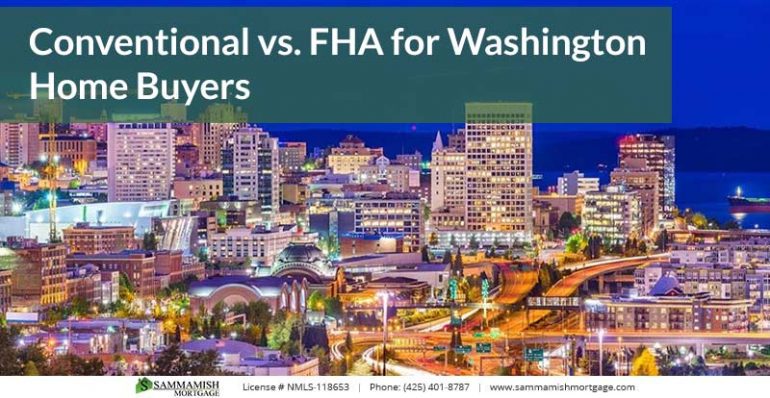No Obligation and transparency 24/7. Instantly compare live rates and costs from our network of lenders across the country. Real-time accurate rates and closing costs for a variety of loan programs custom to your specific situation.

When it comes to applying for a mortgage, should you go with a conventional or FHA loan? This article will discuss each to help you decide which is right for you.
This article provides an overview of the key differences between conventional and FHA mortgage loans for Washington home buyers, and has been fully updated for 2026.
As a home buyer and borrower, you have a lot of choices when it comes to your mortgage financing. One of the primary choices is whether to use a conventional or FHA loan to buy a house in Washington.
If you can afford to put down 20% or more when buying a house, it’s an easier choice to make. A conventional mortgage loan with a down payment of 20% or more will allow the borrower to avoid private mortgage insurance, which can reduce the overall cost of the loan.
But if you don’t have a lot of money saved up for a down payment — and you’re looking for a mortgage loan with a low upfront investment — the choice between FHA and conventional home loans is less clear. And that’s the audience we are addressing today.
If you make a relatively small down payment when buying a house in Washington, you will most likely have to pay for a mortgage insurance policy. This is true for both FHA and conventional home loans.
FHA loan insurance (MIP) — Nearly all borrowers who use an FHA loan to buy a house have to pay mortgage insurance premiums, or MIPs. The upfront MIP is usually 1.75% of the loan amount. The annual premium for most FHA borrowers is 0.8% to 1%, assuming a 30-year mortgage with 3.5% down. The typical FHA home buyer has to pay the annual mortgage insurance for the life of the loan. This is a key distinction from conventional mortgage financing, covered below.
Conventional loan insurance (PMI) — Borrowers who use a conventional (non-government-backed) mortgage loan in Washington with a small down payment usually have to pay for private mortgage insurance, or PMI. Annual PMI premiums typically range from 0.55% to 2.25% of the original mortgage amount per year, but usually runs around the 0.5% to 1% range. The difference here is that PMI can be canceled at a later date, in most cases, when the homeowner has at least 20% equity in the home.
The cost of insurance is another important factor. In many cases, the PMI assigned to a conventional home loan in Washington ends up being lower than the mortgage insurance required for an FHA home loan. But the qualification criteria for borrowers can be a bit more lenient with an FHA loan.
So, both of these programs have an ideal audience. The key is to figure out which one is a good fit for you, based on your financing goals and priorities.
In closing, home buyers in Washington should know that loan limits are increased for 2026. This is true for both FHA and conventional mortgage loans. Federal housing officials raised these limits in response to significant home-price gains that have occurred over the recent past.
Conventional loan limits in Washington State start at a baseline of $832,750 for a single-family home and rise to a high of $1,063,750 for a single-family home in King, Snohomish, and Pierce Counties.
FHA loan limits in Washington range from $541,287 to $1,063,750 for single-family homes in 2026. They vary by county because they are based on median home prices.
Check out our mortgage loan limit tool for conventional, FHA, and VA loans, as well as the 2026 conforming loan limits and FHA loan limits for Washington State.
At Sammamish Mortgage, we offer a wide variety of mortgage programs and tools with flexible qualification criteria, including our Diamond Homebuyer Program, Cash Buyer Program, and Bridge Loans. We have been serving the entire state since 1992, as well as the broader Pacific Northwest region that includes Washington, Oregon, Colorado, and Idaho. Please contact us today with any financing-related questions you have.


Whether you’re buying a home or ready to refinance, our professionals can help.
{hours_open} - {hours_closed} Pacific
No Obligation and transparency 24/7. Instantly compare live rates and costs from our network of lenders across the country. Real-time accurate rates and closing costs for a variety of loan programs custom to your specific situation.
Adjust the parameters based on what you want to track